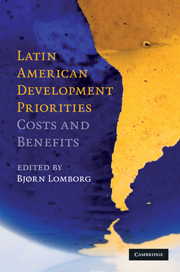Book contents
- Frontmatter
- Contents
- List of figures
- List of tables
- List of contributors
- Acknowledgments
- Abbreviations and acronyms
- Expert panel findings
- Introduction
- Democracy
- Education
- Employment and social security
- Environment
- Fiscal problems
- 5 Fiscal policy reforms in the LAC region
- 5.1 Fiscal policy reforms: an alternative view
- Health
- Infrastructure
- Poverty
- Public administration
- Violence and crime
- Conclusion
- References
5.1 - Fiscal policy reforms: an alternative view
Published online by Cambridge University Press: 05 June 2012
- Frontmatter
- Contents
- List of figures
- List of tables
- List of contributors
- Acknowledgments
- Abbreviations and acronyms
- Expert panel findings
- Introduction
- Democracy
- Education
- Employment and social security
- Environment
- Fiscal problems
- 5 Fiscal policy reforms in the LAC region
- 5.1 Fiscal policy reforms: an alternative view
- Health
- Infrastructure
- Poverty
- Public administration
- Violence and crime
- Conclusion
- References
Summary
Introduction
Miguel Braun's chapter 5 provides a strong case for his thesis that the principal fiscal challenge facing the LAC region is to build on recent gains in achieving fiscal solvency and reduce the procyclical tendency of fiscal policy. He rightly notes the negative consequences of fiscal insolvency and procyclicality on growth, poverty, and income distribution. He argues that there is no scope for complacency, as recent improvement in the region's fiscal position results, at least in part, from unusually favorable external conditions that have contributed to transitory increases in revenues and reduced borrowing costs. At the same time, he notes that public expenditure is rising during the economic expansion, in line with the region's legacy of procyclical fiscal policy.
Based on a broad review of the literature, the chapter argues that insolvency and procyclicality are the result of external shocks, high levels of foreign currency-denominated debt, and politico-institutional factors. It proposes four specific solutions to meet the challenge: issuance of contingent debt instruments, adopting fiscal rules, replacing corporate taxes with personal income taxes, and establishing a policy evaluation agency. It estimates the benefits of these solutions at up to 3 percentage points of GDP per year.
- Type
- Chapter
- Information
- Latin American Development PrioritiesCosts and Benefits, pp. 274 - 292Publisher: Cambridge University PressPrint publication year: 2010



